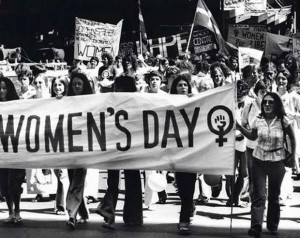100 years of International Women’s Day
March 8th is the centenary of International Women’s Day- join LivLuna in celebrating this awesomeness!
 What is International Women’s Day? The 8th of March is a global day celebrating the economic, political and social achievements of women past, present and future. In 25 countries across the world like China, Russia, Vietnam and Bulgaria, International Women’s Day is a national holiday.
What is International Women’s Day? The 8th of March is a global day celebrating the economic, political and social achievements of women past, present and future. In 25 countries across the world like China, Russia, Vietnam and Bulgaria, International Women’s Day is a national holiday.
The first IWD was observed on 19 March 1911 in Europe- the idea of having an international women’s day was first put forward at the turn of the 20th century amid rapid world industrialization and economic expansion that led to protests over working conditions.
Since its roots in demands for women’s workers’ rights and suffrage (right to vote), IWD has evolved into an internationallly celebrated holiday celebrating the achievements of women on all fronts, while reminding us how much more needs to be done to achieve equality in all social spheres, equal pay, and freedom from gender-based violence.
Did you know? In Russia, March 8th is a national holiday and a really BIG deal- it’s like Valentine’s Day & Mother’s Day combined, but more important, in that men buy women flowers and cards and celebrate them, and give them compliments, but it’s not just for their wives and girlfriends, it’s to all the women in their life- their partners, mothers, sisters and daughters. Awesome right?
Some historical dates from the roots of IWD:
- 1908 15,000 women marched through New York City demanding shorter hours, better pay and voting rights.
- 1911 More than one million women and men attended IWD rallies campaigning for women’s rights to work, vote, be trained, to hold public office and end discrimination. Less than a week later on 25 March, the tragic ‘Triangle Fire’ in New York City took the lives of more than 140 working women, most of them Italian and Jewish immigrants. This disastrous event drew significant attention to working conditions and labour legislation in the United States that became a focus of subsequent International Women’s Day events.
- 1917 Russian Revolution -women began a strike for “bread and peace” in response to the death over 2 million Russian soldiers in war. Opposed by political leaders the women continued to strike until four days later the Czar was forced to abdicate and the provisional Government granted women the right to vote.
- 1920 US women got the right to vote.
Why should we celebrate IWD in 2011? 12 facts about the current state of women’s rights:
- Women perform 66% of the world’s work, but receive only 11% of the world’s income, and own only 1% of the world’s land.
- Women make up 66% of the world’s illiterate adults.
- Women head 83% of single-parent families. The number of families nurtured by women alone doubled from 1970 to 1995 (from 5.6 million to 12.2 million).
- Women account for 55% of all college students, but even when women have equal years of education it does not translate into economic opportunities or political power.
- There are six million more women than men in the world.
- Two-thirds of the world’s children who receive less than four years of education are girls. Girls represent nearly 60% of the children not in school.
- Parents in countries such as China and India sometimes use sex determination tests to find out if their fetus is a girl. Of 8,000 fetuses aborted at a Bombay clinic, 7,999 were female.
- Wars today affect civilians most. 3 out of 4 fatalities of war are women and children.
- Rape is consciously used as a tool of genocide and weapon of war. Tens of thousands of women and girls have been subjected to rape and other sexual violence since the crisis erupted in Darfur in 2003.
- About 75% of the refugees and internally displaced in the world are women who have lost their families and their homes.
- Gender-based violence kills one in three women across the world and is the biggest cause of injury and death to women worldwide, causing more deaths and disability among women aged 15 to 44 than cancer, malaria, traffic accidents, and war.
- In Saudi Arabia and Vatican City, women still don’t have the right to vote.








